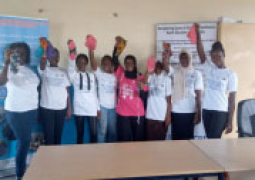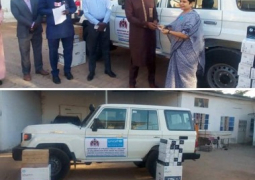The training was held courtesy of sub-Saharan Africa Skills and Apprenticeship Stakeholders Network (SASANET), established in Abuja, Federal Republic of Nigeria, from 23- 25 July 2023, by English- speaking countries.
The skills training was aimed at promoting skills and apprenticeship agenda in the continent and The Gambia was represented at the event by senior government officials and non-state stakeholders.
After participating in the just concluded Abuja forum, SASASNET in collaboration with the Ministry of Higher Education, Research, Science and Technology, yesterday organised a forum to enable Gambian delegates share some of the key outcomes of the Abuja meeting with representatives.
At the event, delegates highlighted the importance of The Gambia-SASASNET and The Gambia’s participation in the initiative designed to chart a way forward in promoting skills apprenticeship development at both the formal and informal sector levels in the country.
Ousman Sillah, secretary general of SASANET, reminded that the primary objective of SASANET is to promote, coordinate, standardise skills and apprenticeship development in sub-Saharan Africa.
“As you all know, the continent is still grappling with skills development for its youth. Africa shall continue to become the poverty capital of the world as many of the youth in The Gambia and other countries, who are largely unskilled and uncertified, are escaping the continent through dangerous means such as the irregular migration or the perilous ‘Back-way route’ to Europe to seek greener pasture.
Hon. Sillah observed that some of the others who are left behind have chosen to focus and invest in skills and apprenticeship development and the training of young people to acquire certificate skills.
On the objectives of SASANET, he said, it is envisaged that SASANET shall create platforms for member countries to share experiences in this effort and even share their various national occupational standards as well as develop an African Skills Qualification Framework (ASQF).
This, he said, will enable easy labour migration across the continent especially with the onset of Africa Continental Free Trade and experiences regarding policies and practices on how to preserve and improve apprenticeship system in the informal economy to promote quality, innovative economic development, and social justice.
He made reference to the Cotonou Regional Workshop held sometime ago, which was deliberated on the informal apprenticeship across Sub- Saharan Africa, further concluding that governments and private sector must join hands to upgrade and formalise all informal apprenticeship in the region.
Sillah recalled that it in that workshop, some delegates decided to set up the sub- Saharan Skills and Apprenticeship Stakeholders Network (SASANET), initially for English speaking countries as they observed Francophone Africa are far ahead of us in skills development





